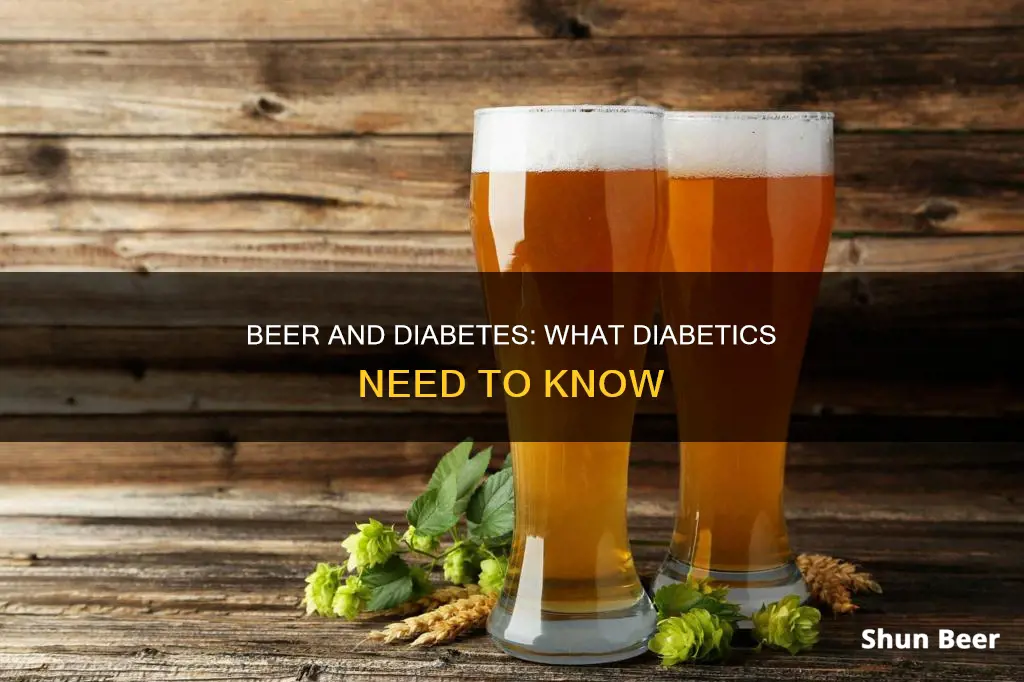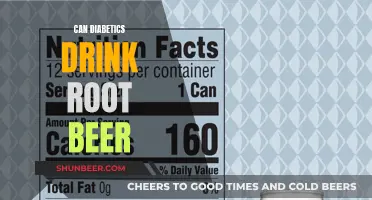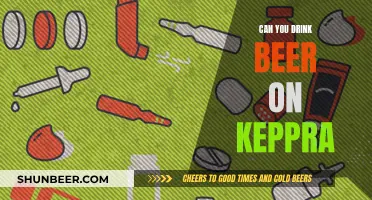
People with diabetes do not need to cut alcohol out of their diet. In fact, light drinking (no more than one to two drinks a day) may be beneficial to diabetes. However, there are some important safety considerations for people with diabetes. Alcohol can affect blood sugar levels and increase the risk of hypoglycemia (low blood sugar levels). It can also increase the risk of weight gain, as it stimulates your appetite and contains a lot of calories. It is recommended that people with diabetes drink in moderation, and not on an empty stomach, to avoid these risks.
What You'll Learn

Drinking beer can affect blood sugar levels
When you drink alcohol, your liver has a hard time releasing glucose (sugar) into your bloodstream and breaking down toxins at the same time. As a result, your blood sugar levels can drop too low, a condition called hypoglycemia. This is especially likely if you drink on an empty stomach, as this will quickly increase the amount of alcohol in your bloodstream. It's important to keep your blood sugar levels stable, as levels below 70 milligrams/deciliter can cause headaches, irregular heartbeat, anxiety, confusion, and even seizures.
To prevent hypoglycemia, it's recommended to drink in moderation and only when your diabetes and blood sugar levels are well managed. For people with diabetes, this means no more than one drink per day for women and up to two drinks per day for men. It's also important to avoid binge drinking or drinking more than four drinks (for women) or five drinks (for men) within two hours.
If you have diabetes and choose to drink beer, there are a few things you can do to help manage your blood sugar levels:
- Don't drink on an empty stomach. Have food or a snack with carbohydrates before or while you're drinking.
- Pace yourself and don't overindulge. Stick to no more than one drink per hour and no more than three or four drinks in a day.
- Choose light beers, which have the lowest carb, calorie, and alcohol content.
- Drink plenty of water to stay hydrated.
- Monitor your blood sugar levels before, during, and after drinking, as well as up to 24 hours after you stop drinking.
Stroke Patients and Beer: What's Safe to Drink?
You may want to see also

Beer is high in carbs
Beer is typically higher in carbs than other alcoholic drinks like wine or liquor. Beer usually contains 3–12 grams of carbs per 12-ounce (355-ml) serving, depending on various factors, such as whether it is a light or regular variety. For example, a pint of regular lager typically varies in carbohydrate content from about 10 to 15 grams, while some light beers may have less than 10 grams of carbs per pint.
Stouts, Porters, and Guinness tend to be on the higher end of the carbohydrate spectrum among beers and can have upwards of 20 grams of carbohydrates per pint. Hoppy craft beers like IPAs and stouts tend to be much higher in carbs, usually containing 15 grams or more per serving. They also tend to be higher in calories and alcohol content, so it is best to stick to just one serving. Pilsners are thought to have a relatively benign effect on blood sugar.
Beer and mixed drinks are especially high in carbs, with certain drinks packing up to 34 grams of carbs per serving. In comparison, dry wines and champagnes will have a lower carbohydrate level than sweeter wines and champagnes. A dry wine can have as low as 1-2 grams of carbohydrates in a modest-sized glass (200ml), whereas a particularly sweet wine could have over 10 grams of carbs.
If you are watching your carbohydrate intake, light beers are the best option as they have the fewest carbs, usually five or fewer grams per serving. They are also lower in alcohol content. So, if you know you're going to have more than one beer, light beers are the way to go.
Drinking Alcohol with Montelukast: What You Need to Know
You may want to see also

Alcohol may reduce medication effectiveness
Alcohol may reduce the effectiveness of diabetes medication. The liver is the organ that stores and releases glucose (sugar) into the bloodstream. It also breaks down toxins so they can be flushed out of the body. When you drink alcohol, the liver has a difficult time doing both jobs at the same time, so it ends up breaking down alcohol instead of releasing glucose regularly. This can cause blood sugar levels to drop too low, a condition known as hypoglycemia. This is especially likely if you drink on an empty stomach, as this will quickly increase the amount of alcohol in your bloodstream.
Drinking alcohol can also affect your body's ability to regulate blood sugar. It can make it drop, especially if you haven't eaten enough. If you've had a big meal and a lot of alcohol, it can also raise your blood sugar levels too high, a condition known as hyperglycemia. This can cause a host of symptoms, including thirst, frequent urination, slow-healing wounds, and disorientation.
Alcohol can also interfere with the positive effects of oral diabetes medications or insulin. This is because alcohol can prevent the liver from turning proteins and fats into carbohydrates when your body needs energy, such as during exercise or between meals. This means that blood sugar levels remain low.
Drinking alcohol can also make it more difficult to manage your diabetes by affecting your judgment and increasing your appetite, which may cause you to overeat and disrupt your blood sugar control. Alcoholic drinks often have a lot of calories, making it more difficult to lose excess weight.
To prevent hypoglycemia, it is important to avoid drinking on an empty stomach. Make sure you have food with your drinks and keep an eye on your blood sugar levels. It is also important to drink in moderation and only when your diabetes and blood sugar levels are well-managed.
Breastfeeding After Drinking: How Much Alcohol Is Safe?
You may want to see also

Drinking in moderation is key
If you have diabetes, you don't need to cut alcohol out of your life completely. In fact, some studies have shown that light drinking (no more than one to two drinks a day) may be beneficial for people with diabetes. However, it's important to be aware of the risks and take certain precautions.
Firstly, alcohol can affect your blood sugar levels, so drinking in moderation is key. Alcohol competes with your liver's ability to produce glucose, which can lead to dangerously low blood sugar levels, known as hypoglycaemia. This can last up to 24 hours after drinking, so it's important to monitor your blood sugar levels closely. To avoid hypoglycaemia, don't drink on an empty stomach and always have food with your drink. It's also important to pace yourself and not overindulge, sticking to no more than one drink per hour and no more than three to four drinks total in a day.
Secondly, alcoholic drinks often contain a lot of calories, which can lead to weight gain. This is especially true of beers, ales, and ciders, which also contain carbohydrates that can increase your blood sugar levels. So, if you're trying to lose weight, you may want to drink less. Opting for light beers, which have fewer carbs and a lower alcohol content, can be a better choice.
Thirdly, alcohol may reduce the effectiveness of your diabetes medication. If you're taking insulin or other diabetes medications, drinking alcohol can increase your risk of hypoglycaemia. It's important to speak to your doctor or healthcare team to understand how alcohol may affect your medication.
Finally, drinking alcohol can have other negative impacts on your health, such as increasing your blood pressure, making neuropathy worse, disrupting your sleep, and increasing the risk of certain cancers and heart disease.
In conclusion, while people with diabetes can drink alcohol, it's important to do so in moderation and be aware of the potential risks and precautions. Always follow the recommended guidelines for alcohol consumption and speak to your doctor if you have any concerns.
CBD Oil and Beer: Is It Safe?
You may want to see also

Beer alternatives for diabetics
If you have diabetes, it's important to be mindful of how alcohol can affect your body and how to manage this. While you can still drink, drinking can interfere with your blood sugar levels and affect your weight.
Light Beers
"Light" or "low-carb" beers have fewer calories and carbohydrates than regular beers. Examples include:
- Miller Lite
- Coors Light
- Bud Light
- Busch Ice
- Busch Light
- Amstel Light
Wines
Wines, particularly red wines, can provide health benefits for people with diabetes. They are also lower in carbohydrates than beer. Examples include:
- Red wine
- White wine
- Champagne (Dry and Brut varieties)
Distilled Spirits
Distilled spirits or hard liquors contain little to no carbohydrates. Examples include:
- Gin
- Rum
- Vodka
- Whiskey
- Martini
- Bloody Mary
- Vodka soda
Low-Carb Cocktails
Cocktails made with low-sugar options and no sugary juices or syrups. Examples include:
- Martini (gin or vodka with dry vermouth)
- Vodka soda
- Bloody Mary (vodka and tomato juice)
Non-Alcoholic Drinks
- Water
- Milk (skim or low-fat)
- Tomato juice
- Unsweetened coffee and tea
Drinking Beer with a Straw: Faster or Fiction?
You may want to see also
Frequently asked questions
Yes, people with diabetes do not need to cut alcohol out of their diet. However, there are some important safety considerations. Alcohol competes with your liver's ability to make glucose when your blood sugar is low, which can lead to dangerously low blood sugar for up to 24 hours after drinking. To prevent hypoglycemia, avoid drinking on an empty stomach and keep an eye on your blood sugar.
Alcohol consumption recommendations for people with diabetes are the same as for the general population: no more than one drink a day for women and up to two drinks a day for men. Binge drinking is strongly discouraged for health and safety reasons. If you're drinking beer, remember that one drink is 12 ounces, or one can or bottle.
The best alcoholic drinks for people with diabetes are those that are low in sugar and carbs. Avoid drinks with a lot of sugar, such as sweet sherries, sweet wines, liqueurs, and cocktails made with sugary mixers. Beer is typically higher in carbs than wine or liquor, but "light" beers have fewer carbs, alcohol, and calories. Spirits, dry wines, and Prosecco are lower in carbohydrates and may be a better option.







